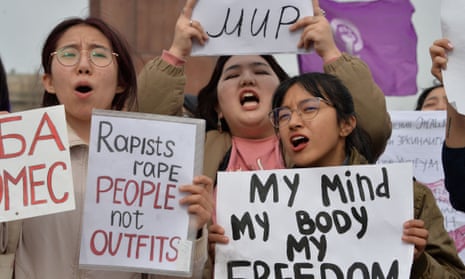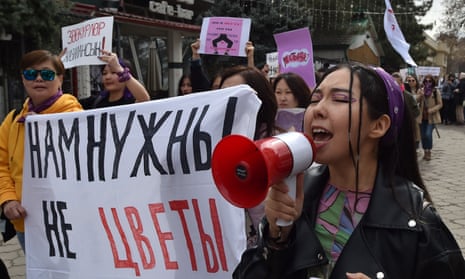Key events

Sarah Johnson
In India, a mural painted by women is being revealed at a metro station. In Mexico, protesters will be on the streets, demanding women’s rights. Jamaica will see the first all-female sitting of parliament. And in China, men will present the women in their lives with gifts. Happy International Women’s Day.
For years, women have marked the now-annual event on 8 March in different ways, but mostly to build momentum on issues that matter to them, and to inspire change.
The day’s origins date back to the beginning of the 20th century: in 1908, thousands of women marched through New York City, demanding better working hours and pay. A year later, the Socialist Party of America declared a Women’s Day.
The idea of an international day came from Clara Zetkin, leader of the “women’s office” for the Social Democratic Party in Germany, while she was at a conference in Copenhagen in 1910. She proposed a celebration on the same day every year to press for demands.
You can read more of this look back of past IWD celebrations here:
Here are some images of women in Bishkek, Kyrgyzstan, taking part in an International Women’s Day rally.


Ireland to hold referendum to remove ‘woman’s place in home’ reference from constitution

Rory Carroll
Ireland is to hold a referendum to establish gender equality and to remove a constitutional reference to a woman’s place being in the home.
The government announcement – timed to coincide with International Women’s Day – said the referendum in November will seek to amend articles 40 and 41 of the 1937 constitution, including this reference: “By her life within the home, woman gives to the state a support without which the common good cannot be achieved.”
The amendment will propose enshrining a specific reference to gender equality and non-discrimination, in line with the recommendation of a citizens’ assembly on gender equality.
“For too long, women and girls have carried a disproportionate share of caring responsibilities, been discriminated against at home and in the workplace, objectified or lived in fear of domestic or gender-based violence,” said the taoiseach, Leo Varadkar.
The National Women’s Council welcomed the announcement. “If passed, this will bring significant change. It would recognise the reality of women’s lives and ambitions in modern Irish society, the true diversity of families, and the importance of care for all of society.”
Really interesting talking to Dr Amanda Gosling at the University of Kent, who has spliced microdata from the Family Expenditure Survey (1978-1999) and the Family Resources Survey (2000-2021), to examine the extent of the “motherhood penalty”.
Her argument is that narrowing of the pay gap between men and women is largely driven by the introduction of the minimum wage and the relative falling wages of working-class men.
She states that the percentage gap in earnings between mothers and fathers with post-school education has actually increased since the late 1970s in the UK.
Here’s an extract from my story today:
According to data from the Office for National Statistics, based on the Annual Survey for Hours and Earnings (ASHE), the gender pay gap for full-time employees was 8.3% in 2022, up from 7.7% in 2021. Among all employees, the gender pay gap is 14.9%.
But Gosling said the gap for mothers was considerably larger than the one represented by the official gender pay gap. By her calculations, the hourly wages of mothers is 72% of the hourly wage of fathers, which reflects the fact that working mums are stalled in their career path, and less likely to go into the highest-paid roles.
The research suggests that for higher-educated women, the gender pay gap has actually worsened since the 70s. Its preliminary findings show that in 1978, mothers aged between 23 and 59 who left school after the age of 18 made about 72% of the wages of equivalent fathers. By 2019 this had fallen to 69%.
This was despite the fact that mothers were now more educated than fathers, added Gosling. In 1978, 10% of fathers and 9% of mothers had any post-school education; by 2019 this had risen to 45% and 48% respectably. “Arguably, then, the current overall gap between the wages of mothers and fathers is understated because is does not control for the fact that mothers are more skilled,” she said.
In contrast, the gap between mothers and fathers without any post-school education has reduced significantly. Using the same datasets, mothers made 57% of the fathers’ wage in 1978, which increased to 70% in 2019.
Dr Gosling said:
Barriers to career progression for mothers with some post-school education have hardly shifted. The gap in pay between mothers and fathers looks very similar now as it did in the late 1970s. The story for Gen-Xers is the same for boomers and the millennials.
Full story here:
Women spend more hours on unpaid care work than men, with the gap particularly wide in low- and middle-income countries.
On International Women’s Day, we would like to hear from women around the world about the caring responsibilities they bear daily. What duties do you shoulder – and how do they compare with your partner’s? How do you feel about this?
We are particularly interested in speaking with women living in countries in Africa, Latin America and Asia. Please get in touch below if you would like to share your point of view.
This report from PwC is also noteworthy. Our economics editor Larry Elliott reports that women in Britain are being priced out of work and suffering from a growing gender pay gap as the result of a lack of affordable child care.
He writes:
With the chancellor thought to be looking at ways of boosting employment in next week’s package, a survey by the consultancy group PwC found the UK slipping down the international league table for women in work.
PwC said Britain had dropped five places to 14th in the ranking of the 38 rich-country members of the Organisation for Economic Co-operation and Development, pointing to the lack of affordable childcare as a barrier to progress.
Data for 2021 showed the gender pay gap widening four times faster in the UK than the average for the OECD, primarily due to the financial penalty from motherhood.
Larice Stielow, a senior economist at PwC, said:
An 18-year-old woman entering the workforce today will not see pay equality in her working lifetime. At the rate the gender pay gap is closing, it will take more than 50 years to reach gender pay parity.
The motherhood penalty is now the most significant driver of the gender pay gap and, in the UK, women are being hit even harder by the rising cost of living and increasing cost of childcare.
With this and the gap in free childcare provision between ages one and three, more women are being priced out of work. For many it is more affordable to leave work than remain in employment and pay for childcare, especially for families at lower income levels.
Full story here:
Another small joy of IWD is watching how many firms delete their self-congratulatory “Women, yay! Equality something, something … commitment in our company etc” once the Gender Pay Gap Bot on Twitter points out how much more they pay men than women.
In this organisation, women’s median hourly pay is 16.3% lower than men’s. The pay gap is 4.6 percentage points wider than the previous year. https://t.co/wUMrY2iC0U
— Gender Pay Gap Bot (@PayGapApp) March 8, 2023
One of my favourite things to do on IWD is celebrate the achievements of individuals or organisations who are actually making a positive difference in the area of gender equality.
Our incredible Lionesses certainly belong in that category. Since their historic Euro 2022 win, the England defender Lotte Wubben‑Moy and the England captain, Leah Williamson, have spearheaded a campaign to provide equal access to all sports in physical education for boys and girls, a minimum of two hours of PE a week and a multimillion‑pound investment in school sports and after‑school activities. Today the government committed to it.
The plans set out to make the same sports available to boys and girls, where wanted, and a minimum two hours of PE a week up to the end of year 11. The government said more than £600m would be provided over the next two years to improve PE and sports in primary schools and up to another £57m to open more school sport facilities outside school hours, especially targeted at girls, disadvantaged pupils and pupils with special educational needs. Parity of provision for girls is to be rewarded with a Kitemark scheme.
Football Association figures published last July showed 72% of girls play as much football as boys in primary school but that the figure drops to 44% in secondary school and that only 40% of secondary schools offer girls the same access to football via after-school clubs as boys.
As Suzy puts it:
This is how you use your voice and the sport for good. This is real, long-lasting, meaningful change. The challenge now will be the make sure it’s followed through and built on for years and years to come. 3/
— Suzy Wrack (@SuzyWrack) March 8, 2023
This is a really excellent comment piece from Nilanjana Bhowmick who argues that in India – like in much of the world – International Women’s Day has been captured by commerce.
IWD is not a spa voucher people!
Is it any wonder that Indian women end up doing almost 10 times more unpaid caregiving than Indian men? If International Women’s Day (IWD) is for taking stock of gender inequalities, let’s do that. If the government was interested in bringing change, it would announce women-friendly work policies. If businesses were serious, they would take a good look at how gender-responsive their organisations are, and make changes.
In Indian society, businesses have managed to dumb down an important day for putting out calls of action to demand political, economic and social equality for women.
IWD is seen as a marketing opportunity, with superficial, slogan-centric, hashtag-dependent campaigns targeted at profits rather than beginning a conversation about vicious inequalities that still persist in this country. The brands are commodifying feminism, but if only they showed true commitment to the day and pushed for gender equalities, they would actually benefit.
A reminder from our diplomatic correspondent Patrick Wintour about why International Women’s Day remains a significant and important day for drawing attention to the huge discrimination, violence and abuse so many women around the globe are subjected to.
He writes about a new campaign calling for gender apartheid to be recognised as a crime under international law – which in an era where Afghan girls are prevented from going to school and Iranian children are killed as anti-regime protests continue, feels acutely needed.
Here’s an extract:
A prominent group of Afghan and Iranian women are backing a campaign calling for gender apartheid to be recognised as a crime under international law.
The campaign, launched on International Women’s Day, reflects a belief that the current laws covering discrimination against women do not capture the systematic nature of the policies imposed in Afghanistan and Iran to downgrade the status of women in society.
Signatories of the open letter include the Iranian Nobel peace prize laureate Shirin Ebadi; the first female deputy speaker of the Afghan parliament, Fawzia Koofi; a commissioner of the Afghan Independent Human Rights Commission, Benafsha Yaqoobi; as well as many activists still fighting for their rights in Afghanistan and Iran.
It’s a crowded field for research and data dumps on IWD, but there are some that stand out.
My excellent colleague Richard Partington – a rare breed of male journalist who regularly writes about economic issues affecting women – has covered a landmark survey by the British Chambers of Commerce (BCC) which shows that two-thirds of women with childcare responsibilities say their career has been stymied by having kids.
Here’s an extract:
Two-thirds of women with childcare responsibilities believe they have missed out on career progression as a direct result, business leaders have warned, amid growing pressure on the government to boost support for parents.
Ahead of next week’s budget, the British Chambers of Commerce (BCC) said tackling barriers to work posed by soaring childcare costs and a lack of support for elderly or disabled relatives was vital for equality and the economy.
In a landmark survey of more than 4,000 women, it found as many as 67% felt childcare duties in the past decade had cost them progress at work – including pay rises, promotions, or career development. Almost 90% believed that additional support was needed.
Read the full piece here:
(As an aside my brother just popped around to give me a proper coffee and a hot cross bun to say happy IWD. Perhaps this could catch on as a new custom that all male loved ones do for the women in their lives? Other suggestions welcome.)
Hello and happy International Women’s Day! I do hope all of our female readers have been woken with a huge cake and and an apology from the patriarchy.
I’ll be with you throughout the day to look at how people around the world are marking International Women’s Day. I’ll also be sifting through the avalanche of PR guff I will be sent today to find some hidden gems of excellent and enlightening research.
But mainly, I want to hear from YOU – are you doing anything to mark International Women’s Day? Do you want to rant a little? Or maybe provide a moment of positivity?
Do it! I’m on [email protected] and @lexytopping on Twitter. I’ll try to get back to all readers, PR folk working for multinational companies with large pay gaps and big IWD promotion budgets….don’t hold your breath.

